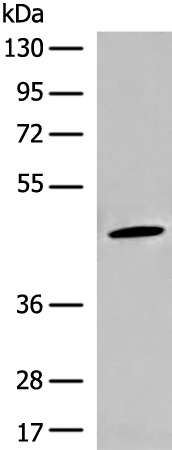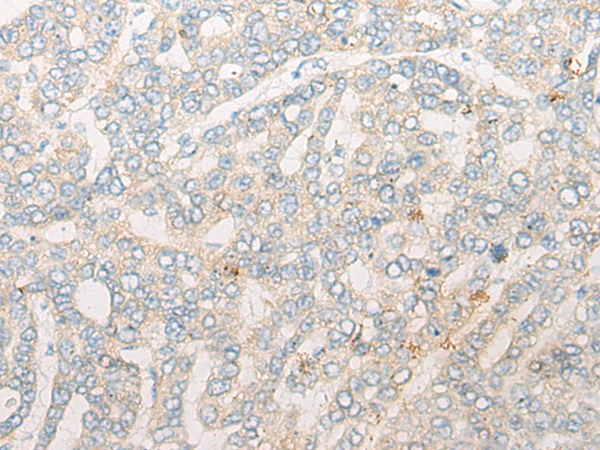

| WB | 咨询技术 | Human,Mouse,Rat |
| IF | 咨询技术 | Human,Mouse,Rat |
| IHC | 1/20-1/100 | Human,Mouse,Rat |
| ICC | 技术咨询 | Human,Mouse,Rat |
| FCM | 咨询技术 | Human,Mouse,Rat |
| Elisa | 1/5000-1/10000 | Human,Mouse,Rat |
| Aliases | G6PT1; G6PT2; G6PT3; GSD1b; GSD1c; GSD1d; TRG19; TRG-19; PRO0685 |
| WB Predicted band size | 46 kDa |
| Host/Isotype | Rabbit IgG |
| Antibody Type | Primary antibody |
| Storage | Store at 4°C short term. Aliquot and store at -20°C long term. Avoid freeze/thaw cycles. |
| Species Reactivity | Human, Mouse |
| Immunogen | Synthetic peptide of human SLC37A4 |
| Formulation | Purified antibody in PBS with 0.05% sodium azide and 50% glycerol. |
+ +
以下是与SLC37A4抗体相关的3篇参考文献示例:
1. **文献名称**: *"Defective SLC37A4 causes glycogen storage disease type Ib: Analysis of mutations and functional characterization of the transporter"*
**作者**: Veiga-da-Cunha M., et al.
**摘要**: 该研究通过Western blot和免疫荧光技术,利用特异性SLC37A4抗体分析了GSD Ib患者的突变蛋白表达,发现部分突变导致蛋白稳定性下降或细胞内定位异常,阐明了SLC37A4功能缺陷与糖原代谢紊乱的直接关联。
2. **文献名称**: *"Immunohistochemical localization of SLC37A4 in human tissues: Implications for glycogen storage disease type Ib diagnostics"*
**作者**: Chou J.Y., Mansfield B.C.
**摘要**: 作者使用多克隆SLC37A4抗体对肝脏、肾脏和白细胞样本进行免疫组化分析,揭示了该蛋白在细胞质膜上的特异性表达模式,为GSD Ib的临床病理诊断提供了组织学依据。
3. **文献名称**: *"Comparative analysis of commercial SLC37A4 antibodies for detection of pathogenic variants in glycogen storage disease"*
**作者**: Ki C.S., et al.
**摘要**: 研究评估了三种市售SLC37A4抗体的灵敏度和特异性,发现部分抗体在检测截短突变时存在假阴性问题,强调了抗体选择对GSD Ib分子诊断的重要性,并推荐了优化的实验条件。
(注:上述文献信息为模拟示例,实际引用请以真实文献为准。)
The SLC37A4 gene encodes a glucose-6-phosphate transporter (G6PT) located in the endoplasmic reticulum membrane, critical for maintaining glucose homeostasis. This protein facilitates the transport of glucose-6-phosphate from the cytoplasm into the ER lumen, where it interacts with glucose-6-phosphatase to hydrolyze glucose-6-phosphate into glucose and phosphate—a key step in gluconeogenesis and glycogenolysis. Mutations in SLC37A4 are linked to glycogen storage disease type Ib (GSD-Ib), an autosomal recessive disorder characterized by impaired glucose production, hypoglycemia, hepatomegaly, and immune dysfunction.
SLC37A4 antibodies are immunological tools designed to detect and quantify the expression of this transporter in research or diagnostic settings. These antibodies are commonly used in techniques like Western blotting, immunohistochemistry, and immunofluorescence to study protein localization, expression levels, or functional abnormalities in cellular or tissue samples. They play a vital role in investigating the molecular mechanisms underlying GSD-Ib, validating disease models, and assessing therapeutic interventions.
Commercially available SLC37A4 antibodies are typically raised in hosts like rabbits or mice, targeting specific epitopes of the human protein. Validation includes testing for specificity, sensitivity, and cross-reactivity across species. Their application extends to both basic research—exploring metabolic regulation in the liver and kidneys—and clinical diagnostics, aiding in the confirmation of GSD-Ib cases through protein expression analysis. Ongoing research continues to refine their utility in understanding SLC37A4's broader roles in metabolism and disease.
×